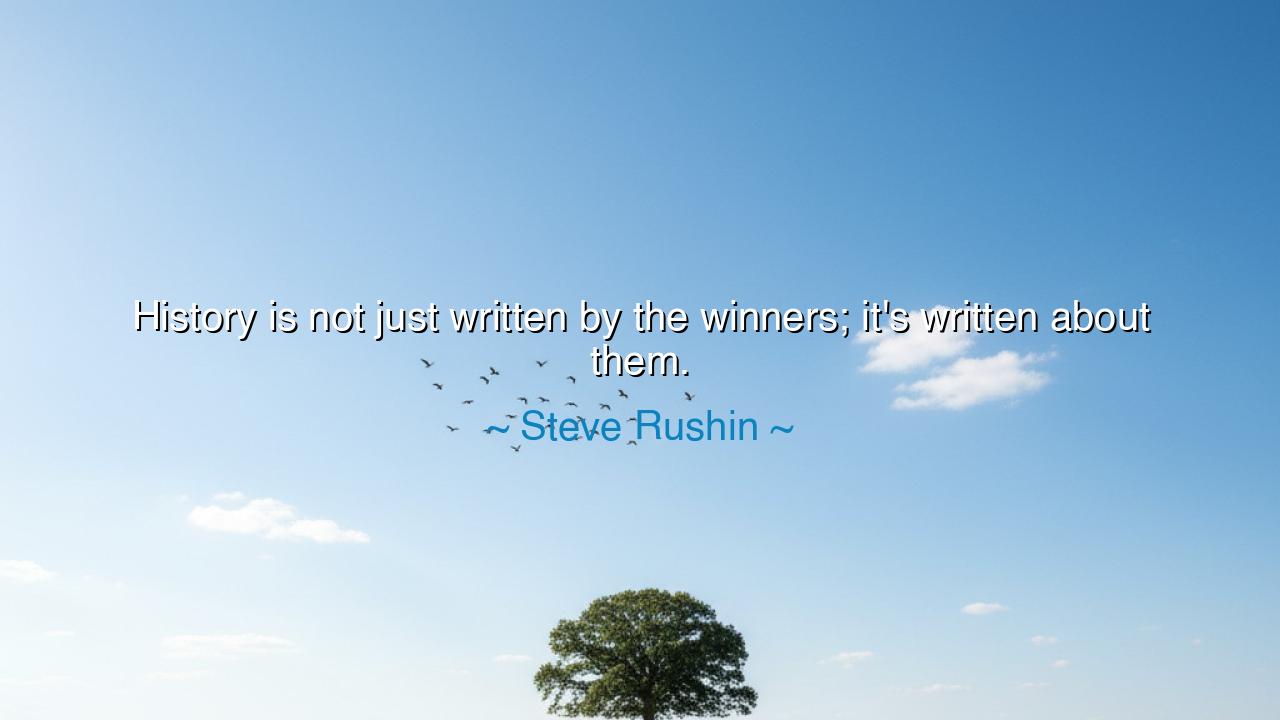
History is not just written by the winners; it's written about






“History is not just written by the winners; it’s written about them.” — Thus spoke Steve Rushin, a writer of sharp wit and quiet depth, whose words pierce through the illusion that the past is merely a story told by those who prevailed. In this brief yet profound statement, he reveals a deeper truth: that history not only reflects the voice of power, but also revolves around it. It is not simply that the victors record their triumphs — it is that the world, by its very nature, becomes fascinated with their story. The vanquished fade into shadow, while the winners are sculpted into legend. This, Rushin reminds us, is both the majesty and the tragedy of human memory.
When we say that history is written by the winners, we acknowledge that those in power shape the narrative to justify their rule. Yet when Rushin adds that it is also written about them, he draws our attention to a subtler form of bias — the way humanity itself is drawn to power, to glory, to the spectacle of success. The chronicles of kings are preserved in gold, while the songs of peasants dissolve like smoke. The generals’ names echo across the ages, while the tears of the mothers they left behind are lost to the wind. In this, Rushin exposes not only the vanity of power, but also the selective nature of memory itself.
The ancient world bears endless witness to this truth. Consider Alexander the Great, whose name blazes across the centuries as the symbol of conquest and ambition. His victories are carved into the stone of history, his life retold in countless tongues. Yet how many remember the Persians who resisted him, or the civilizations his armies crushed beneath their sandals? The world remembers Alexander not merely because he won, but because his victory was magnificent — a tale of daring and glory that captured the imagination of generations. Thus, history became not only his record, but his monument. The defeated vanished, not because they lacked humanity, but because their story lacked spectacle.
Yet even in this imbalance, there lies a moral echo. For though the winners dominate the chronicles, truth often survives in whispers — in poetry, in ruins, in the hearts of those who refuse to forget. Think of the Native peoples of the Americas, whose civilizations were broken by conquest, yet whose spirit still breathes through story and song. They were not the writers of official history, yet their memory endures beyond the empires that conquered them. Time, that great equalizer, often reveals what power sought to conceal. The ancient truth remains: though history may be written about the winners, justice often remembers the forgotten.
Rushin’s insight also warns us of the danger of admiration — that we, as inheritors of history, often worship the conqueror while neglecting the cost of conquest. We build monuments to victory, but rarely to virtue; we study the rise of empires, but seldom their debts to the laboring poor, the enslaved, the silenced. Even now, the modern world celebrates those who succeed — the leaders, the innovators, the powerful — while forgetting the multitudes whose unseen efforts made those triumphs possible. Thus, the cycle continues: the winners dominate not only the story of their time but the imagination of those who follow.
But the wise must look deeper. The true student of history, as the ancients knew, seeks not only the tale of victory but the truth beneath it. Every empire, however mighty, rests upon the shoulders of countless souls — some exalted, many crushed. The poet, the philosopher, and the historian must learn to read between the lines, to hear the voices buried under the marble of triumph. For to study only the winners is to mistake power for virtue and fame for truth. The sage knows that both greatness and ruin leave their mark, and both deserve remembrance.
Let this be your lesson: when you study the past, do not gaze only at the throne, but at the foundation beneath it. Seek the story of the builder, the servant, the rebel, the nameless mother who carried the weight of history’s burdens. Remember that the winners may have written the books, but they did not live all the stories. To truly understand history, you must honor not only those who rose, but those who were trampled in their rising.
And so, as Steve Rushin teaches, remember that history is not just written by the winners — it is written about them. But you, reader and witness, hold the power to change that. Ask who has been forgotten, and write them back into the world. Speak of their courage, their love, their loss. For only when we remember both the crowned and the broken will history itself be redeemed — no longer the story of the victorious few, but the living memory of us all.






AAdministratorAdministrator
Welcome, honored guests. Please leave a comment, we will respond soon